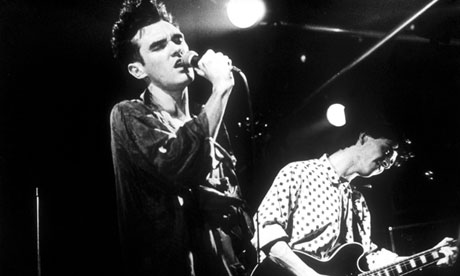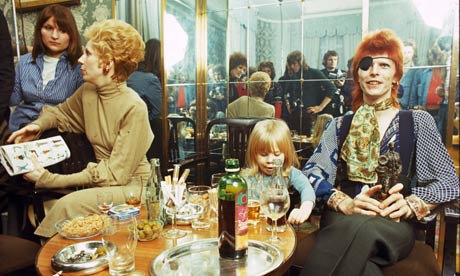Pop's uncanny ability to help us define and understand our lives makes it more powerful than film or books

Morrissey and Johnny Marr of the Smiths. 'I can remember exactly where I was when I first heard How Soon Is Now', says Miranda Sawyer. Photograph: Paul Slattery
Recently, I thought I'd listen to a song I hadn't heard in a while.
Mary Lou Lord's version of
Bob Dylan's You're Gonna Make Me Lonesome When You Go is one of my favourites. It's a live recording, her perfect, almost childlike voice and acoustic guitar adding sweetness to Dylan's heartbreak
classic. So, I cued it up on my phone, whacked up the volume... But I had to stop listening. Gulping sobs on the 159 bus are OK, but not if you're out of tissues and have to use an empty Tangfastics packet to mop your snot.
We all have songs that are so wrapped around our lives that they stop being just songs and become something else. Something more integral to us, like extra DNA, or special blood. Sometimes such songs choose you: I can remember exactly where I was when I first heard
How Soon Is Now by the Smiths (my school common room, after school had shut: I was looking for a bag and it came on the radio). I remember that because I couldn't believe how amazing it sounded. Sometimes you choose the songs: you make up a Spotify list, aka a mixtape, for someone special, or you choose the tracklist for a party, a wedding, a funeral, a birth. Songs can be emotional doctors, or emotional shortcuts:
Sabotage by
Beastie Boys is an instant joy kick for me, a rush of adrenaline and fight-f**k energy. It makes me want to drive my car into a wall. These are the ones that really become part of you.
The Mary Lou Lord song made me cry because I listened to it over and over when my granny died. I can still hear it perfectly in my head, though that doesn't have the same insta-tears effect. I can hear Lord's lingering "high" on "high above", her clipped consonants when she sings "correct", the pause before the last "you're gonna make me lonesome". All beautiful. It's a gorgeous piece of music.
It's also, very clearly, a song about a lost lover. Not a dead granny. Lord did not have a 101-year-old northern Englishwoman with a strong resemblance to Thora Hird in mind when she sang it; nor Dylan when he wrote it. Yet that song helped me through my grief. It captures the pain of a final separation, the not-quite acceptance, the wishing to let go and hoping never to: "You're gonna have to leave me now, I know/ But I'll see you in the skies above, in the tall grass and the ones I love." It doesn't matter that it's not about family love, or ageing, or death.
And that's the thing about music, anyway. It's yours. Films and books tell a specific narrative; they're pinned to their characters, the story, the pretty scenery, the tying up of plot lines into a lovely bow. The best of them can become part of your life, too: you quote lines from
Withnail, you dress like Steve McQueen or Rizzo from
Grease, Renton's opening speech in
Trainspotting sums up how you feel about modern society. But that's just sampling, really. It's not owning. There's more room for us inside music, and more room for music inside us; we can interpret a guitar's howl, a descending bassline, an intake of breath in any way we want. We can take that meaning with us, hug it close. When we mix ourselves up with music, music moulds itself to us.
Now that music is easy to access, in our lives all the time whether we want it there or not, there's an assumption that it has lost its power. And it has, if you look to pop for revolution, for shock, manifesto, style, for a uniting of outsiders into a force for change. (All things I still hope for, though I know I'm kidding myself.) Music is too mainstream to kick anything over these days. But if you move away from the tribe, if you tuck yourself into your own small corner of the world, then music is still as potent as ever. If you're inarticulate with emotion, if you can't understand what's going on, there exists a piece of music that can untangle your feelings better than you ever can.
The older I get, the more I find that amazing. I've been writing about music for 25 years, listening for as long as I remember, and I still don't understand how music works. How can an intentional vibration of air waves, a combination of noise and not-noise, reach so deeply into our beings, stir up feelings of fear and fight and remorse and delight and sex? How does music do that? Not all music has that effect, of course – I don't recall ever having my soul shivered by My Chemical Romance, or anything involving bagpipes – but all music moves the very essence of someone, somewhere out there.
These days, when I'm confronted with a problem that requires more than Dr Google to sort it out, I turn to music. I play a song that I love, or one I don't quite understand, I ask my husband to play me some of the weird Appalachian folk stuff he likes, or I go to YouTube and just scrabble about a bit, checking out old
Sam and Dave live performances or new grimey-housey-what-
is-that? tracks. It all helps. After that, I try to talk to other people cleverer than me: not necessarily about whatever I'm worried about. Usually, something comes out of that. I don't talk to people who don't like music though. We have nothing in common.
This is all a long-winded way of saying, I'm glad I have the job I do. Pop journalism might seem increasingly irrelevant but talking to musicians – clever, emotional, music-loving people – can be very enlightening. (Especially if you talk about something other than their most recent piece of work.) I've just made four programmes for 6 Music on four different themes: separation, calculation, trepidation, jubilation. In each one, I talk to musicians, and music-loving non-musicians, and I play songs that seem relevant. So writer Irvine Welsh talks about merging and separating from his characters; film director Ben Wheatley explains that a film without music can't ever be scary; Dave Rowntree from Blur talks maths and radio; artist
Jeremy Deller talks about how he sees pop as an art form as important as any other, and why, despite this, he feels he should be banned from certain gigs. I play the Pixies, PJ Harvey, Beck, the xx, Fiona Apple, Joy Division, Basement Jaxx, Al Green,
Violent Femmes, a Space Invaders track and the Williams Fairey Brass Band performing Royal House's Can You Party?. Also, the Mary Lou Lord song.
I have no idea if this will help anyone understand anything. Even if it doesn't, at least the people I talk to are all interesting. And maybe I'll play a song that gets you, that you get, that is yours, or becomes yours. The other day, I played the Prodigy's
Firestarter to my seven-year-old son. Within 10 seconds, he started throwing himself around the room in a complicated, furious, jumpy dance. (Pretty much exactly what I do to Sabotage.) He'd never heard the song before, but when it finished, he immediately wanted to hear it again. And again. And again. "That whhrrrggggh noise makes me feel brilliant, Mum," he said. "
I'm a firestarter."






_02.jpg)











